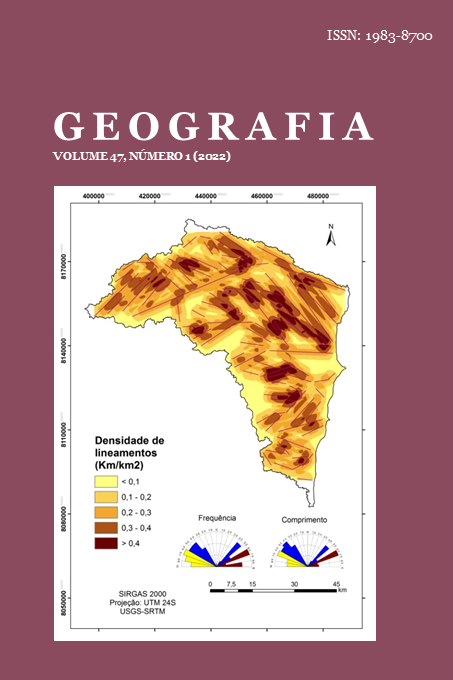EXPLORATORY VEGETATION MAPPING ON ALOCAL LANDSCAPE SCALE: NIR BAND AS ASTARTING POINT
DOI:
https://doi.org/10.5016/geografia.v47i1.16376Abstract
Brazil vegetation map, created by the Brazilian Institute of Geography and Statistics (IBGE) brought amplitude to the systematization of data and studies of the Brazilian biogeography. However, the dimensions of the forest fragments impose a double methodological challenge for identifying of other thematic classes not considered, since they were generalized or even not represented due to the scale of the official maps, (and in updating the information).For that, it is appropriate to discuss methodologies that allow the recognition of heterogeneity in forest fragments based on satellite images. By using CBERS-4 PAN image and image classification, the present study provides a proposal to determine the vegetation heterogeneity in a forest fragment in an area of Dense Ombrophilous Forest (DOF) of the Atlantic Forest biome. The mapping process is supported with the use of open access tools. The results were successful because, Based on the case study, three different vegetation patterns were identified in an area classified as Dense Ombrophilous Forest. The methodology proved to be appropriate for studies with few sample áreas, wich can also guide more assertive future expeditions, (thus increasing the chances of validating) based on information obtained remotely.
Downloads
Published
Issue
Section
License
The authors maintain the copyright and grant GEOGRAFIA the right of first publication, with the articles simultaneously licensed under the Creative Commons BY 4.0 License, which allows sharing and adapting the articles for any purpose, as long as appropriate credits and provisions of image rights, privacy or moral rights. Other legal attributions can be accessed at: https://creativecommons.org/licenses/by/4.0/legalcode.en.
Geography, Rio Claro, SP, Brazil - eISSN 1983-8700 is licensed under the Creative Commons BY 4.0 License.





